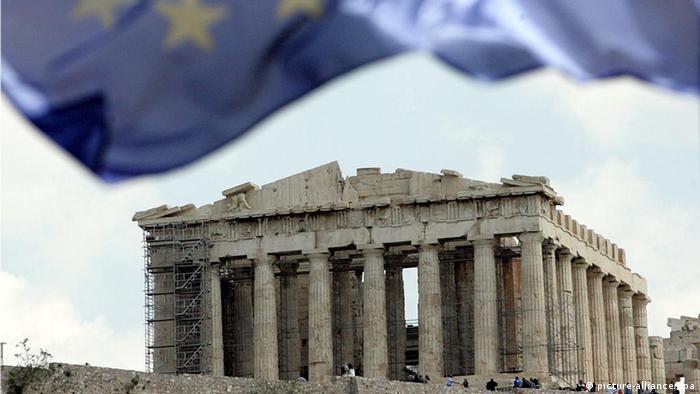Eurozone finance ministers should "see it through" in rescuing indebted Greece, said Jean-Claude Juncker, head of the Euro Group. German officials have been weighing in on the issue. Monday will show what happens.
After failing to reach agreement over its next seven-year budget at the EU summit this past week, the Euro Group - the 17 member countries of the common currency bloc - will have a chance on Monday to demonstrate their ability to act when its comes to helping indebted Greece.
Euro Group finance ministers, chaired by Jean-Claude Juncker - who is also prime minister of Luxembourg - are scheduled to meet for the third time to resolve a deal over the next bailout installment for nearly insolvent Greece.
In the lead-up to the meeting, Juncker said that his patience was running thin. "I think that we need to see things through on Monday," Juncker said in Brussels. "The situation is such that we really have to come to a decision."
This past Friday, November 23, he said that problems had clearly not yet been resolved. On Saturday, he conducted a telephone conference with Euro Group finance ministers to make final preparations for Monday's meeting. Results of that telephone discussion were not made public.
But during the EU summit, Euro Group President Juncker took state and government leaders to task individually - insisting on the urgency of finding a solution for Greece. "I had a good working session with my close friend Antonis Samaras [Prime Minister of Greece], and spoke even longer with German Chancellor Angela Merkel and other government leaders about Greece," Juncker said after the summit closed on Friday in Brussels.
Euro Group looking for 14 billion
 Warm atmosphere, tough negotiations: Euro Group chairman Jean-Claude Juncker (c)
Warm atmosphere, tough negotiations: Euro Group chairman Jean-Claude Juncker (c)
Last Monday, the 17 Euro Group nations and chief of the International Monetary Fund, Christine Lagarde, failed to strike a deal on financing the necessary bailout for Greece. As it stands, Greece requires not only the planned 31 billion euros ($40 billion) as the next bailout loan, but rather 45 billion euros ($58 billion) to make ends meet. Due to the tough recession, euro-zone ministers have urged that Greece be given an additional two years' respite to get its debt to a manageable level - but that extension would cost 14 billion euros ($18 billion) in additional funds.
German Finance Minister Wolfgang Schäuble is rejecting issuing an additional aid package for Greece, which would have to be approved by the German parliament. So Euro Group ministers are faced with the task of finding other ways of filling the gap, with suggestions ranging from interest rate relief for current loans, to suspension of interest payments by way of the European Central Bank, to buybacks of old Greek debts on the financial markets.
But some within the Euro Group are questioning whether those measures would suffice to close the 14-billion-euro gap. Another possibility is the Euro Group's dividing the new partial loan for Greece into smaller amounts - or paying it in installments.
The suggested buyback of Greek debt at reduced value on the financial markets appears unlikely, since the rates for these papers are already rising, Euro Group experts said. According to financial markets traders, major hedge funds are stocking up on the debt papers to profit from the buybacks.
'Greece delivered' - but too late
 Greek Prime Minister Antonis Samaras (r) is getting impatient
Greek Prime Minister Antonis Samaras (r) is getting impatient
Greek Prime Minister Antonis Samaras is annoyed over Euro Group hesitations. On the sidelines of the EU summit, he told reporters with a somber, almost irritated look on this face: "We have fulfilled our obligations. Now it's up to our European partners and the International Monetary Fund to do its share."
Indeed, the European Commission, European Central Bank and International Monetary Fund (IMF) troika certified that Greece had passed the required austerity measures and reforms. But the indebted nation is behind schedule in implementing those resolutions, the troika report said - which is why an additional two years would be necessary to get the burden of debt to the aim of 120 percent of gross domestic product. In addition, the recession has been worse than expected.
IMF could intervene
According to unconfirmed reports from Euro Group circles, IMF chief Christine Lagarde has abandoned her rejection of extending the schedule. The IMF is allegedly prepared to accept Greek debt at 124 percent of gross domestic product in 2020. The original aim was 120 percent. Debt currently makes up 170 percent of Greek GDP. The continued recession is due to make that figure rise next year.
Second cut
 Josef Ackermann wants to see debts cancelled
Josef Ackermann wants to see debts cancelled
The former head of Deutsche Bank, Josef Ackermann, said in an interview with German public broadcaster Südwestfunk that a second debt cut for Greece is necessary. "Is now the right time, or not until the end of the process? Economically, that's not a relevant question. It's more of a political one," he said in the radio interview.
Many Euro Group members and the European Central Bank reject such a debt cut, because they themselves are the creditors and would have to accept significant losses. Private creditors such as banks, major investors and insurance companies already waived a portion of their claims toward Greece last March.
Ackermann is anticipating a debt cut for the public creditors. "It will have to happen eventually. I cannot envision Greece emerging from this miserable situation completely on its own, because growth is just too weak," he said.
"Greece must also become more attractive for investing, and that means reforms of a structural nature. But, one cannot expect a miracle in the country," Ackerman said. DW DE


No comments:
Post a Comment